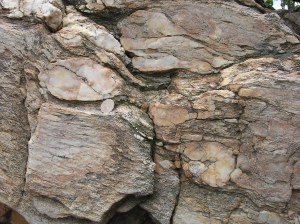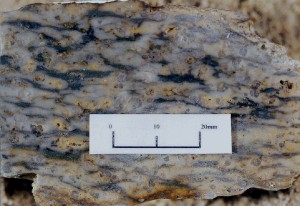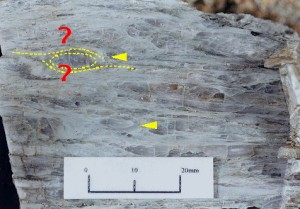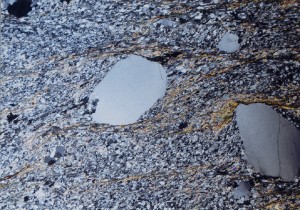This is my first time joining the Accretionary Wedge Geoscience Blog Carnival. The current topic for AW#35 is “What is your favourite geology word?” (hosted by Georneys).
My favourite geology word is this one — MYLONITE
Definition: A fault rock which is cohesive and characterised by a well developed schistosity resulting from tectonic reduction of grain size, and commonly containing rounded porphyroclasts and lithic fragments of similar compositions to minerals in the matrix. Fine scale layering and an associated mineral of stretching lineation are commonly present. Brittle deformation of some minerals may be present, but deformation is commonly by crystal plasticity. (source)
Back in 2000, when I was just starting my career as a geologist, I was assigned to carry out a petrographic study of dynamically metamorphosed rocks in northwest Hong Kong. This was when I first got to understand this word – MYLONITE. In Chinese, the word is translated to 糜稜岩 (Míléngyáng). I actually think that this is the most ‘beautifully’ translated geology word in Chinese.
I have some pictures of mylonite from Hong Kong.
This is a mylonite outcrop. The protolith (parent rock before deformation) is a pebbly quartz sandstone. Several years ago, I wrote a short ‘poem’ describing this outcrop.
在擠壓下、在剪切中,再堅硬的岩石,也被扭曲、變形。
何况是人的心和思想,再堅忍、頑强,最終還得折服。
(Even strong rock can be twisted and deformed.)
The dynamic metamorphic zone in northwest Hong Kong is quite wide. Therefore, the metamorphism has affected not only the sedimentary rocks, but also some granites and volcanic rocks in the region.
This is a hand specimen of mylonitic granite. The porphyroclasts of quartz set in very fine-grained, dynamically recrystallised matrix, showing clear foliation.
This is a mylonitic volcanic rocks under microscope.





Pingback: Accretionary wedge #35 – Porphyroblast | Earth Science Erratics